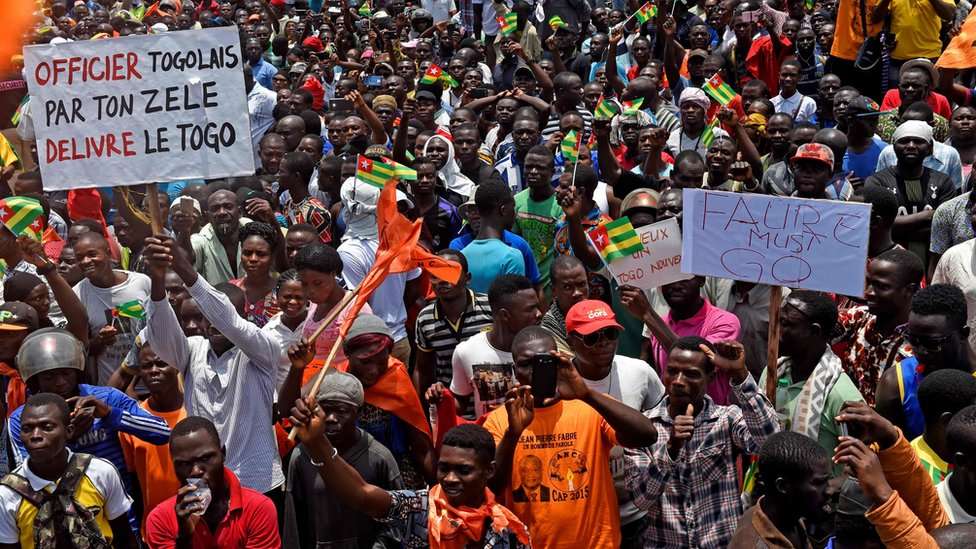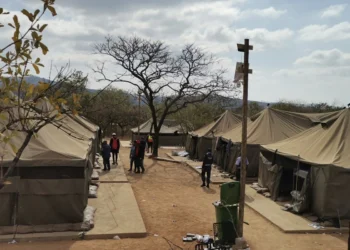In the shadow of oppressive rule, where dissent is stifled and freedom of speech is but a dream, lies the burning question: How does one defy the iron grip of an authoritarian regime?
In the streets of Togo, where voices are silenced and fear reigns supreme, the art of protest takes on a daring form. But amidst the danger and uncertainty, whispers of resistance echo through the street corners, hinting at a resilience that refuses to be snuffed out.
Activists and opposition leaders in the West African country of Togo called for protests to stop the country’s president from signing off on a new constitution that would scrap future presidential elections and could extend his decades-long rule until 2031.
In a recent development, Togo’s lawmakers passed a new constitution, awaiting final approval from President Faure Gnassingbe. This constitution shifts the power to choose the president from direct elections to parliament, a move that raises concerns about Gnassingbe’s potential reelection when his mandate expires in 2025.
The proposed constitution introduces a one-term limit and grants more authority to a role resembling that of a prime minister, officially titled the President of the Council of Ministers.
Additionally, the new constitution extends presidential terms from five to six years. Notably, the almost two decades Gnassingbe has already served in office, following his succession from his father, will not be included in this count.
Calls For Protests A Legitimate Action

The opposition and the clergy say the legislation is an effort by Gnassingbe to extend his rule. Some have promised to stop it from becoming law by calling on the people to rise up and protest.
“We know that the struggle will be long and hard, but together with the Togolese people, we will do everything we can to prevent this constitutional coup d’état,” said Eric Dupuy, a spokesman for the opposition National Alliance for Change party.
”We’re calling on the population to reject this, to oppose it massively,” he added.
However, police on Wednesday, March 27 broke up a news conference called by the opposition, throwing leaders and journalists out of the venue.
The Catholic bishops of Togo spoken out, asserting that the mandate of the parliament expired in December, preceding the upcoming parliamentary elections scheduled for April 20.
They argued that under these circumstances, the lawmakers lacked the authority to pass a new constitution.
In their statement, the bishops called upon President Faure Gnassingbe to refrain from endorsing the new constitution and instead advocated for an inclusive political dialogue following the upcoming elections.
Zeus Ajavon, a lecturer in Constitutional Law at the University of Lome said “The Assembly has no power to revise a constitution. The power to revise the constitution is vested in it during its term of office.”
Ajavon also argued that a referendum was necessary for the country to adopt a new constitution.
The call for protest is justified especially when all the legal avenues and broad consultations necessary to build consensus were not done. An executive and legislative fiat would not suffice when it comes to constitutional change.
Although the political terrain in Togo makes it difficult to hold protests, it is not impossible. The organizers must ensure there is strategic planning and coordination.
Too often, protests are hastily organized without sufficient groundwork, leading to fragmented messaging and disorganized mobilization efforts. In such instances, the efficacy of the protest is significantly diminished, as it becomes easier for detractors to dismiss the movement as unfocused or incoherent.
Moreover, the organizers must sustain the pressure and be consistent or protesters risk losing momentum and allowing their demands to be swept aside. It is worth noting that “the struggle will be long and hard” and possibly cost human lives however, it is a price to pay for freedom from an authoritarian regime.
READ ALSO: Government Urged to Embrace PPPs for National Development





















